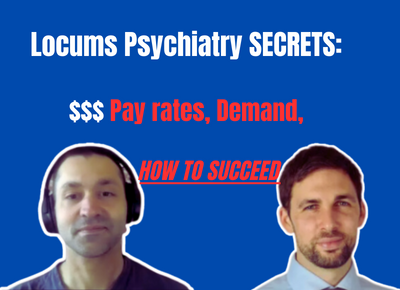

Vlad Dzhashi, MD
It was my pleasure to sit down with Dr. M.C. who decided to start with locum tenens right after his psychiatry training. He provides his unique insight into how to set yourself up for the most successful locums experience as an adult psychiatrist.
We discussed why so many psychiatrists are interested in locum tenens, the pros and cons of locums, his suggestions for finding positions and if the demand for psychiatrists is still strong.
Also, we reviewed how to negotiate the rates, typical hours and patient load, clinical settings and schedules for locum tenens psychiatrists.
Lastly, we delved into ways to best learn during an assignment if you’re a new graduate.
Enjoy reading the interview below, or watch the video here.
Table of Contents
Why choose locum tenens as a psychiatrist
I’m a board certified addiction and general psychiatrist. I actually got interested in locums when I was in med school. I was in a unique program where you traveled around a lot, and I met some locums people there.
When I was finishing residency I was really feeling like I wanted to see family on the west coast, but my girlfriend’s out in New York, and so I was thinking how I try to be around all the people I want to be around, and that’s really where I started remembering I could do locums.
I needed to have more flexibility, and when I began looking into locum tenens again during fellowship I noticed that there was a lot of locums positions, so I had a lot of options that would fit my needs and my training. This seemed to be a much better option compared to any full-time or part-time permanent positions.
Best way to find psychiatry locum tenens jobs
I tend to look for new opportunities in multiple locations, such as job boards, online searches, agency sites, but so far every job I’ve worked I have gone through locum tenens agencies. I am in touch with several agencies, usually through email, and then move to a phone call to discuss specifics.
I did try once to work directly with a hospital instead of an agency, but did not really have any luck. I think direct locums may make sense if you don’t mind putting in the time to handle the logistics, malpractice insurance etc.
My agency offers the Highest pay rates for Psychiatrists
Outpatient and inpatient psychiatry: $275 – 350/hr
Demand for locum tenens psychiatrists
The demand for locum tenens psychiatry has been much greater than I expected. Around the country there seems to be a real mental health crisis, significant wait time to see psychiatry providers an outpatient. There’s an inpatient shortage and I feel that there’s a strong demand for telepsychiatry as well.
I have been able to tailor the type of job I want to suit my flexible schedule, to allow me to see my family and my girlfriend and practice the type of psychiatry I want.
Overall, I was surprised by the number and variety of psychiatry opportunities I have found.
Demand for locum tenens psychiatrists remains HIGH, on both inpatient and outpatient sides.
Psychiatry locums clinical settings
I’ve worked mostly as an inpatient psychiatrist and soon I’m gonna be doing a partial hospitalization addiction psychiatry job. I’ve worked in the ER in Alaska which was a little bit of everything as I was a consultant and covered ER but then I was also at Bridge Clinic and so you kinda work on getting people connected to the next phase of treatment, which is outpatient.
I would say the most demand is inpatient psychiatry, so if you’re open to doing inpatient psychiatry, there seems to be a lot of facilities looking for locum tenens coverage everywhere. With that said, there’s definitely a lot of outpatient jobs too.
As to the inpatient onsite gigs (i.e not telehealth), I think they tend to be in inner city community hospitals that often involve providing patient care to complex patients and a higher census – maybe 10-12 patients and these patients do tend to take more time. But also these hospitals generally have a medical service that takes care of the acute or chronic medical problems.
A lot of the locums staffing psychiatric need is in less desirable cities or more rural areas where it might be more difficult to recruit someone. If you’re open to doing inpatient psychiatry, there seem to be jobs everywhere for that, and if you’re willing to go further away, there are even more psychiatric opportunities.
On the outpatient side, you may be supervising physician assistants, psychiatric nurse practitioner or work solo.
Typical inpatient locums psychiatry settings:
♦ Busy inner city hospitals in less desirable cities
♦ Rural areas
Pay-rates for locum tenens psychiatrists
I feel like the locum tenens pay rate for psychiatrists is like a “black box” and the agencies are not always up front about pay.
With that said, I have seen a range of pay for locum tenens psychiatry. Just after residency, before I learned to negotiate, I took a job for $210/hr. But I think 300/hr per hour is typically the max that I’ve seen, and the range is somewhere closer to $250/hr.
For call coverage, well, I haven’t done too much call, but I have seen the pager fee of anywhere between 200 and 300 per night and the call-back rate was close to the regular rate.
Locums psychiatrist pay rates:
♦ Average $250-300/hr.
♦ Pager fee/call coverage 200-300/night
♦ Call back hourly rate $300+/hr
Negotiate locums pay as a psychiatrist
Regarding negotiation, the more information you have, the more leverage you have in the negotiation. If I’m able to talk to a bunch of recruiters and understand what’s being offered for similar jobs, I can take that information back to the negotiation.
If they give you something way out of proportion to what you’ve heard, you can tell them, and it’s amazing how quickly they might change their numbers.
Nefotiation tip for locums psychiatrists:
♦ Discuss the pay rates with as many recruiters as possible to know your worth before commiting to any job
Pros and Cons of locum tenens for psychiatrists
As a locum psychiatrist, the biggest benefits have been the flexibility and control over my schedule. I can work in different locations so that I can spend time with family or my girlfriend and adjust to their schedules. I can even take a month off to pursue a different activity.
Another huge plus is the ongoing variety of cases, the continued learning coming directly out of training. Instead of narrowing your focus, locums force you to keep that resident mindset where you’re always learning. With each assignment I learn about the culture of medicine in that location, the laws that impact psychiatry in that location and psychiatric care.
Of course, locums isn’t perfect and it’s not for everyone. It can be a challenge to jump into a new environment that is possibly having some trouble keeping a psychiatrist. If you find it hard to handle challenging and sometimes chaotic environment with less stability, then locums may not be for you.
There is also a lot of paperwork, credentialing, locums licensing and every new hospital requires a lot of documentation, onboarding, EMR training, etc.
Pros of locums for psychiatrists:
♦ Schedule flexibility
♦ Better compensation
♦ Continued learning as a clinician
Cons of locums for psychiatrists:
♦ Sometimes challenging and choatic work environment
♦ A lot of papework
Tips for locum tenens psychiatrists
The more organized you are, the better off you will be. This includes keeping track of patient logs, your hours, your CME, all of your information. I know some locums doctors even use a personal assistant to stay on top of things.
Another piece of advise is that you really need to understand your strengths and weaknesses so that you know what kind of assignment you’re looking for. This will really help you make the best decisions as a locums psychiatrist.
General tips:
♦ Stay organized and keep track of all your documentation
♦ Know your strength and weaknesses to find perfect assignment
How to succeed as a locums psychiatrist fresh out of residency
My advice is to build a network of people that you can turn to for advice. Each time you enter a new hospital you can find the people who are really good and who might know a lot about certain areas.
For example, there’s a social worker at my current hospital and I’m always asking them questions about resources and options.
Each state has different risk mitigating strategies, and I need to make sure I understand the laws in that particular state. It’s important that I can identify the people that are experienced and good with resources and be able to communicate and work with those people.
Tips for locums psychiatrist fresh from training:
♦ Build a network of people in the healthcare that you can turn to for advice
♦ To limit the risk as a psychiatrist, learn about the relevant laws in each state
What would you do differently if you started as a locum tenens psychiatrist again
I think I would try to talk to as many locums psychiatrists as possible. I would say, don’t jump into it blindly. The more information I could have gotten in advance, the more I could have prevented some downsides.